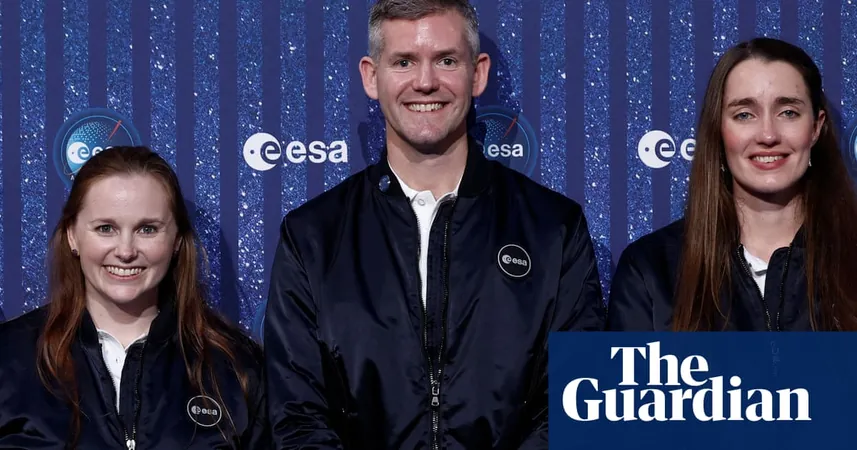
Breaking Barriers: John McFall Aims to Become the First Astronaut with a Disability
2024-10-07
Author: Li
When John McFall first saw a job advertisement for aspiring astronauts, he felt an immediate spark of excitement. "Honestly, the first thing that came to my mind was, ‘It would be awesome to go to space,’" he said.
However, the journey to reach beyond the confines of our planet is herculean, especially for someone looking to break through the long-standing glass ceiling of space exploration that has kept individuals with disabilities grounded for decades. Despite the odds, McFall, now 43, is on the cusp of making history as the world's first astronaut with a disability.
Losing his right leg in a motorcycle accident at just 19, McFall turned adversity into strength, becoming a Paralympic sprinter who clinched a bronze medal in Beijing. He later pursued a career as a trauma and orthopaedic surgeon. That diverse skill set now fuels his aspiration to conquer the final frontier.
Three years ago, McFall began the grueling selection process with the European Space Agency, navigating through a series of challenging evaluations—ranging from psychomotor tests to intense interviews. In 2022, his perseverance paid off when he was selected to join an ambitious project aimed at exploring the viability of people with physical disabilities living and working in space.
“It’s incredibly exciting,” McFall shared in a recent interview. "Many people are left wondering, ‘Why hasn’t this been done sooner?’"
Though there's no certainty he will actually fly to space, the rigorous requirements of a forthcoming six-month mission to the International Space Station are underway. “We have to provide data to demonstrate that this is possible,” he explained. “It’s not that people are doubting our capabilities, but rather that no one has attempted this yet.”
Current tests focus on how he would navigate a microgravity environment and how his prosthetic limb would respond to the unique conditions of space. Encouragingly, preliminary findings suggest that space travel could indeed be feasible for McFall, potentially paving the way for others with similar disabilities to train for missions in the future. “I hope that by 2027 or by the end of this decade, we’ll see a European astronaut with a physical disability as part of the crew on the International Space Station,” he added.
However, the project isn't solely about McFall; its broader goal is to create pathways for others with disabilities to follow in his footsteps. McFall passionately advocates challenging the stereotypes surrounding physical disabilities, sparking vital discussions that aim to dismantle stigmas.
One aspect of this dialogue is the terminology used to describe him. Since his induction into the European Space Agency, McFall has sought to question the widely-used title "parastronaut." He believes labeling can often perpetuate divisions—he states, “I’m not a para-surgeon; I’m a surgeon. I’m not a para-dad; I’m a dad.” By framing his identity in this way, he strives to foster a more integrated view of individuals with disabilities.
His efforts have broader implications, particularly in a landscape where people with disabilities often face discrimination, unemployment, and poverty. Data from the EU highlights these issues, showing that many individuals with disabilities struggle to find employment or live above the poverty line.
By redefining what an astronaut can look like—through his actions and successes—McFall aims to create more opportunities in diverse professional fields for people with disabilities. “My goal is to ensure that people have a nuanced understanding of disability and what it truly means to be disabled today," he remarked. "We need to move past the outdated perceptions from the early 20th century.”
John McFall’s journey doesn’t just represent personal ambition; it embodies a revolutionary step toward inclusivity and representation in one of humanity’s most profound endeavors: space exploration. As he continues along this extraordinary path, the world watches closely, hoping for a future where the sky is truly the limit for everyone, regardless of their physical challenges.

 Brasil (PT)
Brasil (PT)
 Canada (EN)
Canada (EN)
 Chile (ES)
Chile (ES)
 España (ES)
España (ES)
 France (FR)
France (FR)
 Hong Kong (EN)
Hong Kong (EN)
 Italia (IT)
Italia (IT)
 日本 (JA)
日本 (JA)
 Magyarország (HU)
Magyarország (HU)
 Norge (NO)
Norge (NO)
 Polska (PL)
Polska (PL)
 Schweiz (DE)
Schweiz (DE)
 Singapore (EN)
Singapore (EN)
 Sverige (SV)
Sverige (SV)
 Suomi (FI)
Suomi (FI)
 Türkiye (TR)
Türkiye (TR)